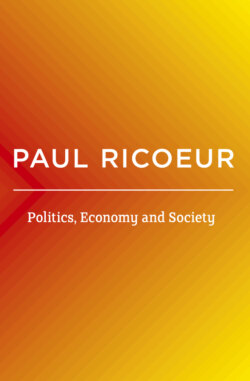Читать книгу Politics, Economy, and Society - Paul Ricoeur - Страница 6
Notes
Оглавление1 1 See History and Truth, tr. C. A. Kelby (Evanston: Northwestern University Press, 1965); Time and Narrative, 3 vols, tr. K. McLaughlin (Blamey) and D. Pellauer (Chicago: University of Chicago Press, 1984–88); From Text to Action: Essays in Hermeneutics, tr. K. Blamey and J. Thompson (Evanston: Northwestern University Press, 1991); Memory, History, Forgetting, tr. K. Blamey and D. Pellauer (Chicago: University of Chicago Press, 2004).
2 2 Paul Ricoeur, Lectures 1. Autour du politique (Paris: Le Seuil, 1991).
3 3 Paul Ricoeur, Lectures on Ideology and Utopia, ed. G. H. Taylor (New York: Columbia University Press, 1986).
4 4 Paul Ricoeur, Le Juste 1 (Paris: Éditions Esprit, 1995) and Le Juste 2 (Paris: Éditions Esprit, 2001).
5 5 Paul Ricoeur, Oneself as Another, tr. K. Blamey (Chicago: Chicago University Press, 1992).
6 6 An earlier collection of Paul Ricoeur’s interviews and dialogues, Philosophy, Ethics, and Politics, tr. K. Blamey, ed. Catherine Goldenstein with a Preface by Michaël Foessel (Cambridge: Polity Press, 2020), concerned ethical and political questions. The present volume offers a selection of articles and lectures collected to shed light on the progress of Ricoeur’s political thought.
7 7 This article is reprinted in Ricoeur, History and Truth, pp. 247–70.
8 8 This text anticipates “Should We Renounce Hegel?,” a chapter in Time and Narrative 3, published eleven years later (pp. 193–206).
9 9 “Ideology and Utopia,” in From Text to Action, pp. 300–16; and Lectures on Ideology and Utopia.
10 10 This task assigns the work of interpretation to citizens. In this way, Ricoeur employs in the domain of the political the “graft of hermeneutics onto phenomenology,” which he had introduced into his philosophical method as early as the 1960s.
11 11 The figure of the “political paradox” does not refer to a stance of indecision, but to a sense of compromise. Ricoeur himself warns against “what can be paralyzing in a position that oscillates between two poles” in Philosophy, Ethics, and Politics, p. 14.
12 12 On this important axis of Ricoeur’s political project, see the article “Freedom” (1971), reprinted in Philosophical Anthropology, tr. D. Pellauer (Cambridge: Polity Press, 2016), pp. 124–48.
13 13 Unavailable to the general public, considering that this text was published in le Bulletin de liaison des professeurs de philosophie de l’académie de Versailles, and had limited circulation. It is, moreover, to be paired with an article on the same topic bearing almost the identical title published in 1996, “Le paradoxe de l’autorité,” in Le Juste 2.
14 14 See also, Ricoeur, Philosophy, Ethics, and Politics, p. 27.
15 15 See Paul Ricoeur, “Ethics and Politics” (1983), reprinted in From Text to Action, pp. 317–28.
16 16 Paul Ricoeur, The Course of Recognition, tr. D. Pellauer (Cambridge, MA: Harvard University Press, 2005).
17 17 A question under debate is whether the encounter with the work of John Rawls marks a social-democratic turn in Ricoeur.
